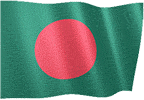Communications via Satellite has emerged as a major media of communications and has effectively overcome the limitations of conventional terrestrial communication links. As a result an area of communication has emerged that is now referred to as "Satellite Communication". Asia-Pacific lags far behind developed nations of Europe and North American in Telecommunications. The geographical barriers of the Asia-Pacific region have hindered the growth of communications and responsible for the slow development of the region. This has led to a digital-divide between the Asia-Pacific region and the industrialized Western Nations.
Satellite communications only can surmount the Asia-Pacific regions natural barriers and bring the advantages of the advanced communications to every corner of the region in a cost-effective and timely manner. It is against this background that an educational programme must provide the scholars from developing nations with skills to appreciate the fullest potential of the technology. In recognition of this necessity, the Centre has formulated a postgraduate educational programme to cover the basics of communication systems and provide an in-depth orientation to the understanding of projects in the field. The course enables the students from participating countries in preparing satellite based communications projects, policy, definition, establishment of communications systems, use of operational systems, public awareness on the benefits of satellite based communications technologies in the improvement of the quality of life.
The courses are conducted at the Space Applications Centre (SAC), which is a premier centre for Space Applications Research and Development. The primary goals of SAC are to conceptualize, plan and conduct research that will enable the application of space technology for the socio-economic benefits of the country.
All Educational Programmes are conducted in English. In principle, students are expected to be sufficiently fluent in English, but facilities for improving their English Languages skills are made available to those students who want to avail of this facility, upon their arrival on campus. The courses are taught in classroom environments with the use of modern teaching methods and tools, and also include multimedia tutorials for self - study. Practical are given in the laboratories and skill development environments of the DOS institutions.
For each courses there are course directors who overall guides and frame the programme. There are course coordinators who assist for day to day educational programme.
- Eligibility
- Course Content
- Selection of Candidates
- Faculty
- Language
- Course Director & Course Coordinator
- Course Expenses
- Space Applications Centre (Host Institute for SATCOM Course)



















